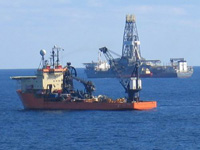Natural Gas and the Environment
In its raw form, natural gas is a greenhouse gas. After it’s been processed, natural gas burns cleaner than other fossil fuels. It’s currently considered an important fuel source, but it’s still a substantial contributor to global warming.
Drilling
Leaks
"Cleanest" Fossil Fuel



Looking for natural gas deposits and drilling for them is harmful to habitats on both land and sea. New horizontal and directional drilling procedures are trying to maximize the amount of gas obtained from a single source and minimize the impact on the surrounding environment.
If released into the atmosphere in its raw form, natural gas can be much more potent and dangerous than carbon dioxide. Unfortunately, small leaks can sometimes occur in the storage and transportation infrastructure such as wells, tanks or pipelines. A leak can lead to an explosion.
Natural gas is the most evolved fossil fuel because it contains only carbon and hydrogen. Compared to coal and oil, it has fewer emissions. In fact, it burns the most cleanly forming only water and carbon dioxide in the process. Almost no ash particles are left behind. Lastly, because of its chemistry, natural gas provides the most energy per carbon dioxide molecule emitted.
